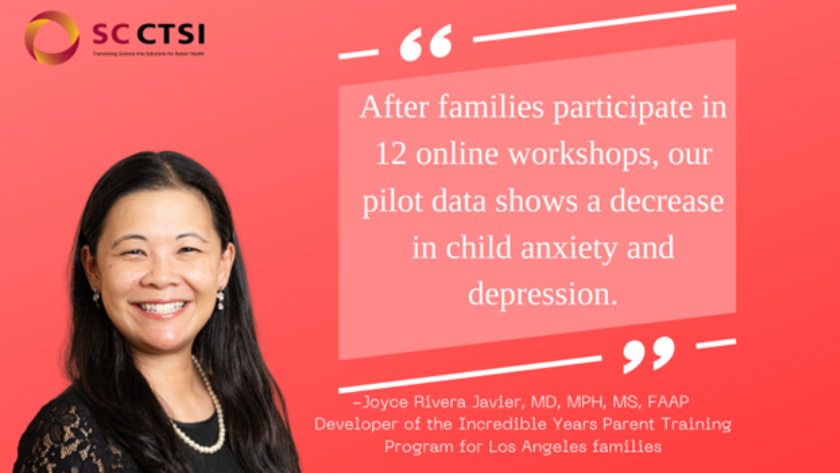SC CTSI-affiliated researcher gains local and national recognition for leadership in helping improve mental health among Filipino American families

Pediatricians today are struggling to find urgent mental health services for their depressed or suicidal patients who often endure long wait lists for psychiatric beds. This crisis can be especially acute among children and adolescents in urban, low-income immigrant neighborhoods. The large—yet understudied—Filipino immigrant community in Los Angeles has experienced extreme mental health disparities, including alarming levels of adolescent suicidal thinking and attempts.
Over the past decade, an investigator jointly appointed at USC and Children’s Hospital Los Angeles has been working with Filipino families to help them prevent mental health crises.
“We are offering parents some tools that they can use to help their children," said Joyce Rivera Javier, MD, MPH, MS, FAAP, an associate professor of clinical pediatrics and population and public health sciences at CHLA and the Keck School of Medicine of USC. “But parents are experts in their own lives and child-rearing.”
Traditional Filipino immigrant families often stigmatize those who pursue mental health solutions. That's why Javier began meeting Filipino families where they felt safest—in local faith-based settings.
She implemented the Incredible Years Parent Training Program for Los Angeles families, an evidence-based, preventive parenting program that was culturally tailored for Filipino immigrant parents in low-income, urban neighborhoods.
“In Incredible Years programs, we do not tell parents what to do,” said Javier. “But we do give them tools of ‘positive parenting,’ including skills that are needed in this social media and digital age.” The Incredible Years model encourages parents to avoid physical and verbal disciplining of children and instead improve their listening skills and use more positive reinforcement.
Her efforts have gained national recognition. Javier received a prestigious 2021 Robert Wood Johnson Foundation Award for Health Equity. In October 2022, she and other award winners were recognized by a series of pre-recorded celebratory videos featuring stories about their work.
Javier is also a co-investigator on the five-year grant renewal of the University of Southern California Clinical and Translational Science Institute (SC CTSI) from the National Institutes of Health. And she is a member of the leadership team within the CTSI Community Engagement core, coordinating outreach to Asian American and Native Hawaiian Pacific Islander populations.
When the COVID-19 pandemic shut down the in-person Incredible Years program, Javier adapted by providing virtual 12-week workshops and expanded parent participation from the Los Angeles Filipino communities to the entire state of California, including Spanish-speaking families.
The Incredible Years approach works equally in-person and remotely, according to a pilot study by Javier. “After families participate in 12 online workshops, our pilot data shows a decrease in child anxiety and depression, and that’s all by focusing on what the parents can do at home,” said Javier.
Javier has recently further expanded the project to include an Incredible Years Parents and Babies Program.
“We now offer parenting workshops to new mothers, including Spanish-speaking mothers, and virtual workshops in the toddler age. I see this is an important model to help prevent mental health problems rising in our country.”
But Javier wants to reach more parents.
“We asked participating parents how to attract more people to the program,” she said. “Parents recommended increasing awareness about the high rates of suicide, substance abuse and depression in the community. We created a video in which Filipino parents described mental-health disparities and gave testimonials so that Filipino families could see that their own families are at risk. In a study, we found that the video was effective in increasing enrollment rates in the program.”
Over the years, she has received significant research support and mentorship from SC CTSI, starting with a KL2 grant. “When I was a junior scientist, the people of SC CTSI helped me get my career off the ground. I wouldn't be where I am today without their support, which has helped me give back to the community that raised me. I've learned how to listen to the community, but also rigorously research our programs to understand what works. It's been so rewarding for me to see, one by one, families transform,” said Javier.



